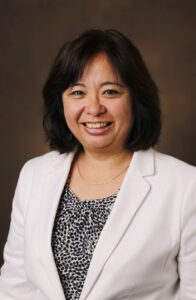 In January, Cecilia Pilar Chung, MD, MPH, began her new appointment as director of the Division of Rheumatology at the University of Miami. Previously, Dr. Chung was an associate professor of medicine at Vanderbilt University, Nashville, Tenn., for more than 10 years.
In January, Cecilia Pilar Chung, MD, MPH, began her new appointment as director of the Division of Rheumatology at the University of Miami. Previously, Dr. Chung was an associate professor of medicine at Vanderbilt University, Nashville, Tenn., for more than 10 years.
At Vanderbilt, Dr. Chung built a strong research portfolio, focusing on the comparative safety of pharmaceutical agents, and the pharmacogenetics of immunosuppressant agents. Her clinical research has focused on novel cardiovascular risk factors in patients with systemic lupus erythematosus (SLE) and rheumatoid arthritis. She is the 2022 recipient of the ACR Henry Kunkel Early Career Investigator Award, and the 2022 recipient of the Leon Goldberg Early Investigator Award from the American Society for Clinical Pharmacology and Therapeutics.
We spoke with Dr. Chung in December 2022.
When she was presented with the opportunity to visit Miami, Dr. Chung had already been thinking about how she wanted to further develop as a researcher, clinician and contributor to academic medicine.
Born and raised in Peru, Dr. Chung says one of the primary attractions of her new position was the possibility to serve patients from Hispanic backgrounds. During her initial visit to Miami, she performed rounds with the rheumatology fellows. Two of the three patients they met spoke Spanish, and one was from her home country.
Goal 1: Pediatric Cardiology
Dr. Chung notes that she is the first physician in her family, recalling that she was attracted to medicine at a very young age. “I started saying I wanted to be a doctor when I was a child,” she says. In Peru, medical school begins right after high school, so Dr. Chung was only 16 years old when she began her eight-year course of study to become a physician. She obtained her medical degree from the Universidad Nacional in Lima in 1998, completing her internship the same year. The next step was a fellowship in rheumatology at the same institution.

Dr. Chung
Dr. Chung’s original goal in medicine was to become a pediatric cardiologist. However, a combination of “great clinicians and patients with very complex diseases” gave her an appreciation of how interesting and challenging a career in rheumatology could be. She distinctly recalls encountering three patients during her rheumatology rotation—two with systemic lupus erythematosus and one with polymyositis—who were quite ill but who did well after discharge from the hospital.
Maria Segami-Salazar, MD, and Manuel F. Ugarte-Gil, MD, MSc, professors, were powerful models for how to provide compassionate care, and they also demonstrated a love of teaching, she says. Dr. Chung’s first research project, examining the relationship between low-dose prednisone and bone mineral density in patients with rheumatoid arthritis, was written under the mentorship of these two Peruvian rheumatologists.
Pursuing a Research Track
After completion of her first rheumatology fellowship, Dr. Chung was convinced she needed to go abroad to pursue further research training. Another fellowship followed, this time at the University of Alberta, Edmonton, where she worked in the laboratory of Anthony S. Russell, MD, FRCDC.
Dr. Russell advised her that her next step as a developing researcher would be to obtain an MPH, and Dr. Chung did so at Vanderbilt University, studying with Theodore (Ted) Pincus, MD, currently professor of medicine at Rush University, Chicago, and Tuulikki Sokka-Isler, MD, PhD, a professor of rheumatology, University of Eastern Finland, Faculty of Health Sciences, Kuopio.
Dr. Chung also began working with C. Michael Stein, MBChB, FRCP, a professor of medicine in the Division of Clinical Pharmacology within the Department of Medicine at Vanderbilt University Medical Center, and pharmacoepidemiologist Wayne Ray, PhD, a professor of health policy at Vanderbilt University School of Medicine, who had founded the Masters in Public Health program. Under their guidance, Dr. Chung expanded her inquiries into the variability of drug responses. She had been fascinated by this area since her time as a medical student in Lima. With Drs. Stein and Ray, she was able to further develop her understanding of pharmacoepidemiology, ultimately joining the research faculty at Vanderbilt.
Final Course of Study
Although her research was going well at Vanderbilt, Dr. Chung received advice from Drs. Stein and Ray that it was important for her, as an evolving clinical researcher, to “not forget about the white coat”—that is, taking care of patients. She was not yet licensed to practice in the U.S., so this represented the final building block for her research career. Dr. Chung moved to Baltimore to obtain certification via the American Board of Internal Medicine research pathway. There, she says, “I got to work with many of my heroes in rheumatology.”
After completing her clinical training, Dr. Chung had the opportunity to return to Nashville, where she resumed her research and, ultimately, became an associate professor.
Looking forward, Dr. Chung reports that, for the near term, her research focus at the University of Miami will follow the same lines of inquiry. She believes there will be plenty of new opportunities to look at genetic determinants of health disparities in Miami, with its diverse patient population. From a clinical perspective, she sees opportunities to expand subspecialized care at the University of Miami and at the Miami VA hospital. Further, with the influx of Hispanic trainees fostered through the university’s Harrington program, Dr. Chung has set a goal to attract strong physicians from Latin America who are interested in rheumatology training here in the U.S.
“This will be an opportunity to facilitate multidisciplinary care for patients with autoimmune conditions,” she says.
Gretchen Henkel is a health and medical journalist based in California.


